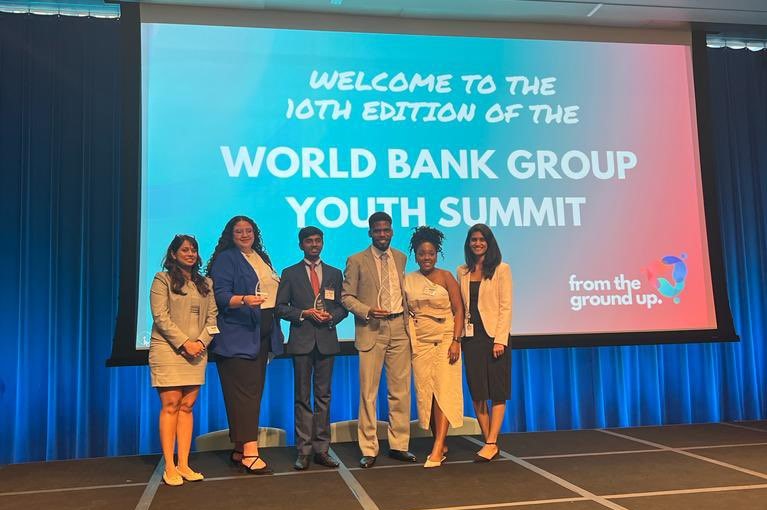

Local regenerative ocean farm, Kee Farms, has emerged as the winner of the World Bank Youth Summit 2023 Pitch Competition award.
The competition took place on the second day of the two-day World Bank Youth Summit 2023.
Established in 2013, the World Bank Youth Summit is an annual event hosted by the World Bank Group (WBG) to engage with youth globally on the most pressing issues facing their generation. The primary goals of the Youth Summit are to:
- Empower youth to explore innovative ideas to tackle development challenges
- Provide youth with the tools to build and engage in impactful projects
- Promote dialogue between youth, the WBG, and other key stakeholders globally

Represented by co-founder and chief executive officer (CEO) Nicholas Kee, the Jamaican-based ocean farm won the award after the delivery of a presentation showcasing the positive impact Kee Farms has had and continues to have.
“We’re essentially a regenerative ocean farm focused on climate change litigation through ocean regeneration and restoration based in Jamaica. We essentially started this a few years ago because of the global problems related to climate change [such as greenhouse gas emissions and depleted biodiversity], But, on a more local level, we really started this because of ‘Patchy’. I happen to live close to a fishing village and [he] is a well known fisherman there, said Kee during his eight-minute pitch presentation.
“Over the past few years, we’ve heard complaints from Patchy about the depleting fish stock over 15-20 years. He hasn’t been able to catch fish to then feed [the community] and this has resulted in him not being able to feed his family. This meant, at least for him, that he needed to find other sources of income and what that looks like, practically, in Jamaica is taking towards the guns for drugs trade between the US, the Bahamas, Haiti, Jamaica and even South and Central America,” he added, noting that it is not a unique problem to Jamaica or other Caribbean countries.

He said that over 50,000 fisherfolk in Jamaica participate heavily in this practice. He also shared that the problem is not unique to Jamaica as it is scaled across entire Caribbean region.
He noted that the problem of depleted fish stock is not just because of the global climate change issue. Kee said that the depletion has happened on a regional level because of the influx of sargassum seaweed along with industrialisation problems related to the ‘big fish’ industry as well as the tourism and mining industries.
“So, we decided to venture down the path of solution and brain storming. Turns out that the solution was staring us in our faces. It happened to be seaweed,” he said noting that seaweed can be found in multiple everyday-use products such as food and beverages, beauty products, pharmaceuticals and even toothpaste.

He also mentioned that seaweed can be used to create biodegradable cardboard and it can be turned into activated carbon biochar and fertliliser.
The Kee Farms CEO, in his presentation said that “seaweed isn’t necessarily just a social solution. [It] contributes to carbon sequestration and capture reduction in ocean acidification, increase in biodiversity, removal of a lot of the excess nutrients from farms as well as the revitalisation of the ocean eco-system.”
The regenerative ocean farm recently completed their pilot project and is now working with fisherfolk to help them establish their own ocean farms within their communities.

They plan to secure land on which they can continue to train fisherfolk islandwide. Doing that will allow the farm to scale their independent operations for seaweed, oysters, sea cucumbers, sea grass, conch, and contribute to the preservation of mangroves. I
“It is through that practice that we will help fisherfolk members set up their own operations so that we can buy biomass from them [and] double down on buying equipment and then turn that biomass into different byproducts along the value chain,” he said.
“Competition is sparse in the region but, we have competitors internationally,” he said, explaining that the international competition is not able to provide the diversity of seaweed species endemic to the Caribbean region, thus making Kee Farms a cut above the rest.

Additionally, “we incorporate a grassroots methodology using fisherfolk members as the integrating tool to drive our production,” he noted.
Kee also spoke of the revenue streams where they can sell raw seaweed to varied buyers mostly from the US and Europe.
They plan to create different byproducts from the seaweed with their focus being on agar, cardboard, and biochar. Interestingly, Kee Farms is interested in the biodiversity and carbon credits space. As such, Kee and his team are working on carbon accounting to facilitate them entering that specific industry.
“We would be the first in the Caribbean to follow on this track,” he highlighted.
Kee Traction

In terms of achievements, Kee Farms has, thus far raised US$100,000 in grant funding. They have been nominated for the Earthshot prize and they have patent pending for activated carbon.
The Kee Farms team have also worked closely with the governments of Jamaica and Barbados to ensure replicability across the Caribbean region and “hopefully the rest of the world.”
Kee Farms believes heavily in the triple bottom line impact metric. So, at our peak, we’ll be able to provide opportunities for over 4000 fisherfolk members each year. We’ll be able to increase their revenue stream five times over. So, instead of earning 300 or less each month, they’ll be earning US$1,500 as they continue partnering with us and at our peak, we’ll be able to combine close to two million tonnes of carbon dioxide each year.
Future and Next Steps
As far as the future is concerned, they plan to maximise on their commercialisation plans so that they can access more buyers of the seaweed and their by-products. They are also engaged in fundraising with a target of US$5 million to continue and expand their work.
Get in touch with Kee Farms on Instagram @keefarmshq or on their website, keefarms.com
RELATED Kee Farms nominated for Earthshot prize for work in reviving the ocean
Send feedback to [email protected]







Comments